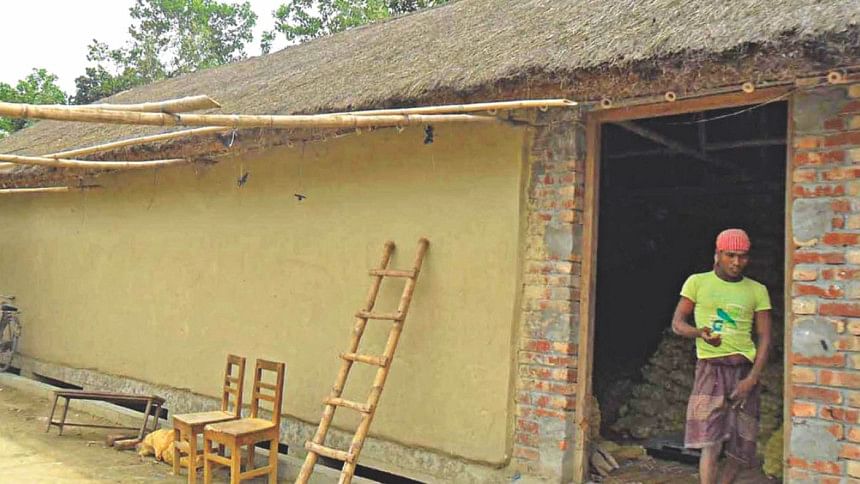5 yrs on, still works properly without electricity

More than five years ago, seed trader Touhidul Islam Bakul, from Kamlapur village in Dinajpur's Kaharol upazila had a dream. He decided to build a cold storage facility, but one with a difference. Built using traditional cooling features it requires no electricity.
With an outer structure of earth, brick and bamboo, and paddy residue covering its rooftop, the 110 tonne facility was constructed in Jagdal area of nearby Birganj town in 2011. It features bamboo flooring and shelves and beneath the building is a reservoir which acts as a cooling device but can also accommodate a fish farm. The unique building has small holes to allow for the passage of air and light.
"I spent Tk 5.62 lakhs to build my cold storage warehouse, on 2 decimals of land" says Bakul. Inaugurated on February 2, 2012, the facility has long since proved itself. It still works properly.
"We call it natural cold storage," says Bakul, "The structure and cooling systems rely on natural resources only."
Perishable crops including potatoes, pointed gourds and cucumbers can be stored without difficulty for up to six months, while cauliflowers can be stored for a month and cabbages for up to 75 days, all for an electricity bill of zero.
According to local farmer Puren Roy, the electricity-run cold storage facilities charge them up to Tk 350 to store a 75 kg sack of potatoes, while the storage rate for the same produce at the natural cold storage facility is only Tk. 75.
"Besides," Puren says, "in the last five years there has been no report of produce rotting at Bakul's storage facility. But the electricity-run facilities run into difficulties during periods of extensive load shedding."
Local Department of Agriculture Extension official Nikhil Chandar Biswas says natural cold storage has raised local famers' hopes in being able to store their produce effectively and cheaply. "It costs to build the facility," says Bakul, "but maintenance expenses are negligible; and storage costs are zero."
With the proven success of Bakul's facility, the innovative return to traditional design is being replicated elsewhere.
Shahidul Islam, a farmer of Kuatpur village in Joypurhat's Panchbibi upazila has built his own small facility. "I've used it to store potatoes since March this year," he says, "and they are still in good condition. Farmers will not face produce loss if they rely on natural cold storage."
According to Bakul, in recognition of the success of the facility in Dinajpur, over the last four years with the help of NGO Manusher Jonno Foundation, market development project Katalyst and consulting firm Gmark, natural cold storage facilities have been constructed in several other districts including Khagrachhari, Bandarban, Bogra and Joypurhat.
Farmers can also build natural cold storage at any size, from 20 to 200 tonne capacity, for themselves.

 For all latest news, follow The Daily Star's Google News channel.
For all latest news, follow The Daily Star's Google News channel. 



Comments